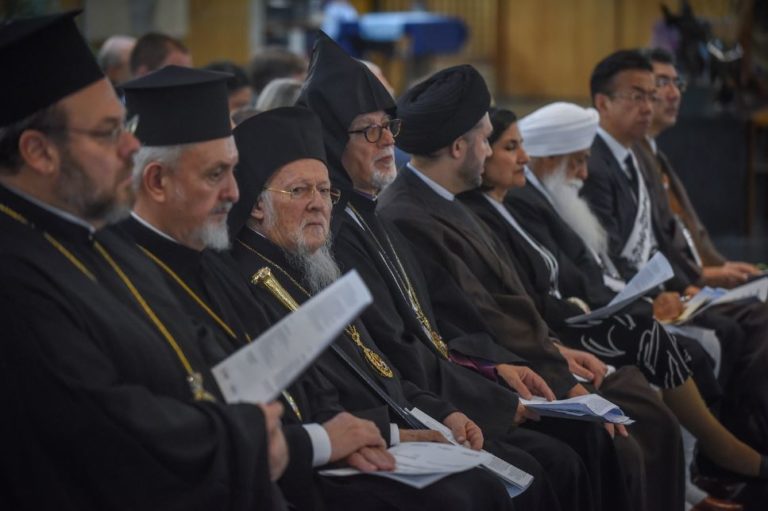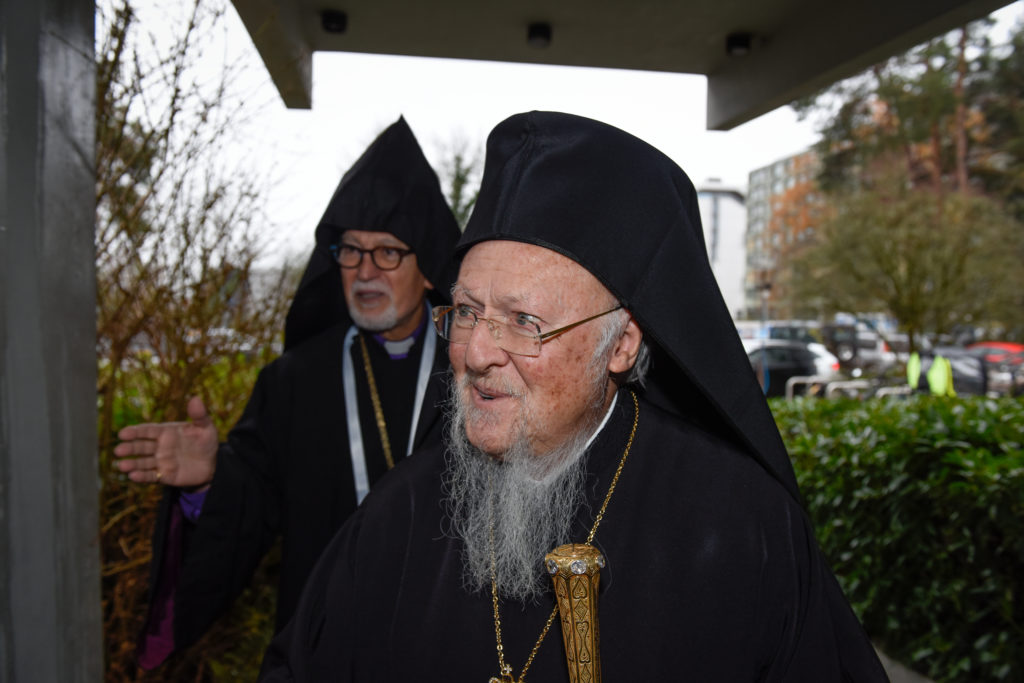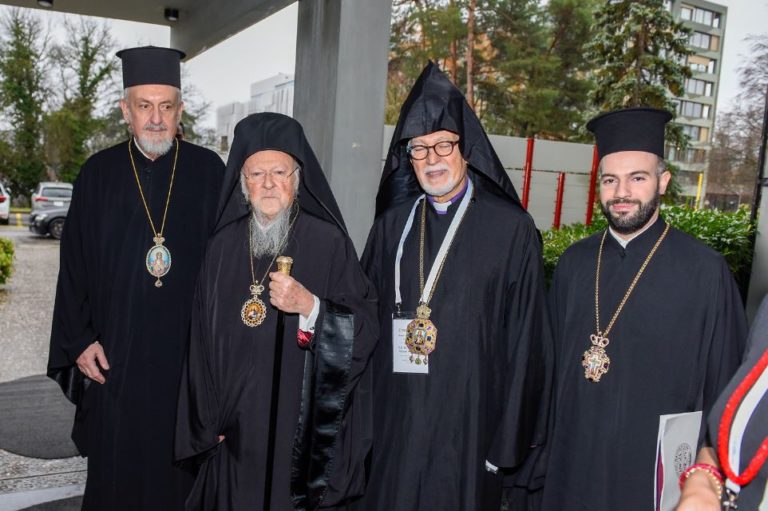Την ανάγκη να συμβάλλουν όλοι αποφασιστικά για την αντιμετώπιση της κλιματικής αλλαγής και της προσφυγικής κρίσης υπογράμμισε η Α.Θ. Παναγιότης ο Οικουμενικός Πατριάρχης κ.κ. Βαρθολομαίος, ο οποίος ήταν ο κεντρικός ομιλητής στη συνάντηση “Religious Leaders Unite for Climate Peace in Solidarity with Refugees” (Οι θρησκευτικοί ηγέτες ενώνονται υπέρ της κλιματικής ειρήνης εν αλληλεγγύη με τους πρόσφυγες), που πραγματοποιήθηκε την Τρίτη, 12 Δεκεμβρίου 2023, στην έδρα του Παγκοσμίου Συμβουλίου Εκκλησιών, στη Γενεύη, στο πλαίσιο της Παγκόσμιας Διάσκεψης για τους Πρόσφυγες και τους Μετανάστες, η οποία διοργανώνεται από 13 έως 15 Δεκεμβρίου, στην ίδια πόλη, από την Επιτροπή του Ο.Η.Ε. για τους Πρόσφυγες (UNHCR, the UN Refugee Agency).
Ο Παναγιώτατος, μιλώντας στην αγγλική γλώσσα, ανέφερε, μεταξύ άλλων, τα εξής:
“Ένα από τα μαθήματα που διδαχθήκαμε κατά τη διάρκεια της πρόσφατης πανδημίας —αν και με πολύ οδυνηρό και σίγουρα ακούσιο τρόπο— είναι ότι κανείς δεν σώζεται μόνος του, κανείς δεν σώζεται αν δεν σωθούν όλοι. Οι απειλές που αντιμετωπίζει ο κόσμος μας αυτή τη στιγμή μπορούν να αντιμετωπιστούν και να ξεπεραστούν μόνο σε συνεργασία. Και εδώ είναι που ο διάλογος και η σύμπραξη των θρησκευτικών κοινοτήτων αποδεικνύονται ουσιώδη και ζωτικής σημασίας. Διότι είτε μιλάμε για τον Covid-19, είτε για την κλιματική αλλαγή, ή για το προσφυγικό αδιέξοδο, σίγουρα έχουμε να κάνουμε με πρωτόγνωρες προκλήσεις. Αυτός είναι ο λόγος που αναφερόμαστε σε αυτές και ως κρίσεις, που είναι ένας ελληνικός όρος, ο οποίος υποδηλώνει την απαγγελία «κρίσεως» — ακριβώς επειδή αξιολογούμαστε με βάση τον τρόπο που ανταποκρινόμαστε σε αυτές τις περιστάσεις, καθώς είναι σημεία καμπής ή φαινόμενα που διαμορφώνουν καθοριστικά τις ζωές μας. Στην πραγματικότητα, ενώ ο κορωνοϊός μπορεί να σχετίζεται με την ιατρική, η ρύπανση με την επιστήμη και η μετανάστευση με την πολιτική, ο τρόπος με τον οποίο ανταποκρινόμαστε και επιλέγουμε να επιλύσουμε αυτές τις προκλήσεις είναι ακριβώς εκεί που πρέπει να εμπλέκονται η πίστη και η θρησκεία.”

Ο Παναγιώτατος στην ομιλία του αναφέρθηκε στις προσπάθειες του Οικουμενικού Πατριαρχείου για την ευαισθητοποίηση της παγκόσμιας Κοινότητας για το ζήτημα της υπερθέρμανσης του πλανήτη και της περιβαλλοντικής βιωσιμότητας, υπενθυμίζοντας ότι επίμονα και κατ’ επανάληψη ο ίδιος έχει διατυπώσει τη θέση ότι “η κλιματική αλλαγή συνιστά πρωτίστως ένα πνευματικό και ηθικό ζήτημα – και όχι μόνον ένα κυβερνητικό ή τεχνολογικό πρόβλημα, σα να ήταν απλώς ένα από μια μακρά λίστα διλημμάτων που αντιμετωπίζουν οι πολιτικοί ειδικότερα και οι άνθρωποι γενικότερα”. Όπως είπε, σε άλλο σημείο, οφείλουμε να αναγνωρίσουμε τον κόσμο ως μεγαλύτερο από εμάς και τα συμφέροντά μας, και γι’ αυτό πρέπει να είμαστε έτοιμοι να εξετάσουμε επιλογές και λύσεις που επηρεάζουν εμάς προσωπικά και όχι μόνον άλλους ανθρώπους.
Ολοκληρώνοντας την ομιλία του, ο Οικουμενικός Πατριάρχης, δεήθηκε προς τον Θεό να είναι ελεήμων και συμπονετικός με τον λαό Του, ιδιαίτερα με εκείνους που βρίσκονται εν ανάγκαις και τους εκτοπισμένους. “Ας φανταστούμε έναν κόσμο όπου επικρατεί η ειρήνη και η δικαιοσύνη, όπου η βία και οι διακρίσεις εξαλείφονται, όπου τα ανθρώπινα δικαιώματα και η ανθρώπινη αξιοπρέπεια προστατεύονται αποτελεσματικά. Και ας ανοίξουμε τις καρδιές μας στην αλληλεγγύη προς τους πρόσφυγες, καθώς και στον σεβασμό και την προστασία του μοναδικού δώρου της δημιουργίας του Θεού, που καλούμαστε να κληροδοτήσουμε στα παιδιά μας.”
Τον Παναγιώτατο προσφώνησε, εκ μέρους του απουσιάζοντος Γενικού Γραμματέα του ΠΣΕ, ο Σεβ. Αρχιεπίσκοπος Δρ Aykazian Vicken, Αντιπρόεδρος της Κεντρικής Επιτροπής του διεκκλησιαστικού αυτού Οργανισμού, ενώ, στην ίδια συνάντηση, ομίλησε και ο Σεβ. Μητροπολίτης Γέρων Χαλκηδόνος κ. Εμμανουήλ.
ADDRESS by His All-Holiness Ecumenical Patriarch Bartholomew at the WCC Town-Hall Discussion on Interfaith Dialogue, Climate Change, and Refugee Displacement (December 12, 2023)
Distinguished colleagues and congregants,
Beloved organizers and participants,
Celebrating the 75th anniversary of the United Nations Universal Declaration of Human Rights, it is a special privilege to attend and address this unique assembly of religious leaders, devout citizens, and people of good will, in our shared concern and prayerful objective to consider ways of responding to urgent challenges in a world where uncertainty seems to be the only sure reality faced by so many of our brothers and sisters across the planet.
Climate change and the refugee crisis are no longer an external or remote possibility, far removed from our daily attention and responsibility. They are immediately and profoundly affecting our lives, our careers, and our lifestyles. We no longer have the false luxury of ignorance or indifference. We are now either directly contributing to the problem or else decidedly committed to a solution.
One of the lessons that we learned during the recent pandemic—albeit in a very painful and certainly involuntary manner—is that no one is saved alone; no one is saved unless everyone is saved. The threats that our world is currently facing can only be addressed and overcome in collaboration. And this is where the dialogue and partnership of religious communities proves to be essential and vital. Because whether we are speaking of Covid-19, climate change, or the refugee predicament, we are certainly dealing with unprecedented challenges. This is why we even refer to them as crises, which is a Greek term that signifies a pronouncement of “judgment”—precisely because we are measured by the way we respond to these circumstances inasmuch as they are turning points or phenomena that definitively shape our lives. In fact, while the coronavirus may involve medicine, and pollution may involve science, and immigration may involve policy, the way we respond to and choose to resolve these challenges is exactly where faith and religion should be involved.

As you will be aware, throughout our ministry over the last decades, we have repeatedly underlined that—as the distinctive and defining issue of our time—global warming has become the greatest threat to our planet and its population. The growing but neglected toll from rising global temperatures will undoubtedly and undeniably eclipse the current number of deaths from all the infectious diseases combined if climate change is not constrained. Environmental sustainability will only be achieved through drastic lifestyle changes that we must make. That is why we have persistently and consistently underlined that climate change primarily constitutes a spiritual and ethical issue—not only a governmental or technological problem, as if it was merely one in a long list of dilemmas confronting politicians in particular and people in general.
What religious leaders must always remember and consequently remind civic leaders is that there is no way of endlessly manipulating our environment and its resources that comes without cost or consequence—material and human. We are—as we know very well today, and as mystics have taught very clearly through the ages—intimately and inseparably bound up with the history, present, and destiny of our world.
However, in order to appreciate such a worldview—which is ultimately a worldview of frugality and simplicity, of gratitude and generosity—we must acknowledge the world as larger than ourselves and our interests; in other words, we must adopt a spirit of honesty and humility. We must be prepared to look at options and solutions that affect us personally and not just other people. Unfortunately, so often, we are convinced that solving the ecological crisis is a matter of acting differently or living more sustainably. But we should never forget that it is our very options and actions that led us to this mess in the first place.

Paradoxically, then, the answer may lie not so much in doing something as in doing nothing; which brings us to the importance of silence and meditation. First, we must stop what we are doing and reflect. First, we must learn to listen and understand how we have reached this crisis. First, we must accept our sinfulness toward the planet and other people so that we can acknowledge the need for repentance—which involves a literal and radical change of mind, heart, and behavior. This is the way of the prophets; this is the way of the mystics; and this is the way of those who realize that “the earth is the Lord’s and all the fullness thereof” (Psalm 24.1).
And this is why our moment of silence is the most appropriate action in this chapel today. Let us, therefore, beseech God to be merciful and compassionate on us and His people, especially those in need and displaced. Let us imagine a world where peace and justice prevail, where violence and discrimination are dispelled, where human rights and human dignity are effectively protected. And let us open our hearts to solidarity with refugees as well as to respect and protection of the unique gift of God’s creation that we are called to transmit to our children.

